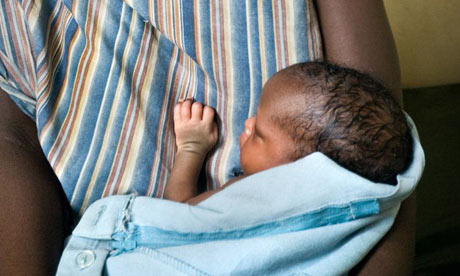
The birth of a baby, which should be a joyful occasion, too often brings heartbreak and agony for African families. Pregnancy and childbirth complications are the leading cause of death and injury for women in developing countries. Yet women are key to the health and wealth of their communities. Without them, the family cannot hope to thrive.
In Africa, a staggering one in 22 women dies in pregnancy or childbirth. In the UK, it is just one in 8,000. While conditions such as high blood pressure, breech births and haemorrhaging are easily treated in the UK, African women are likely to die from them because they lack access to good quality health care or a trained midwife. Only 37% of births in the least developed countries are attended by a skilled health worker.
Many women, particularly in remote areas of Africa, have little choice but to give birth to their babies at home. With their mother or grandmother at their side, they are lucky if the birth goes smoothly and there are no complications. But if things go wrong, the nearest help can be hours away. With no transport, this means their only option is to walk, often in the middle of labour, to get help.
Reference is commonly made to the 'three delays' which raise mortality rates:
• Delay in seeking care: women may have to get permission from the male head of the household, may not recognize the emergency, or may fear attending a health care facility.
• Delay in arriving at a health care facility: transportation may be unavailable, unaffordable or simply take too long.
• Delay in receiving care once at the health care facility: health centres may lack staff, equipment or supplies; richer patients or males may be seen first; or care may be unaffordable.
• Delay in arriving at a health care facility: transportation may be unavailable, unaffordable or simply take too long.
• Delay in receiving care once at the health care facility: health centres may lack staff, equipment or supplies; richer patients or males may be seen first; or care may be unaffordable.
These are explanations, but they are not excuses. It is still outrageous that one woman is dying every minute in pregnancy or childbirth.
So what are the stories behind these facts? Consider the economic and political factors that are causing these delays to persist. Is enough investment being made in improving maternal health? Is maternal mortality high enough on the political agenda? Why do health centres lack staff and equipment? What role do health workers play in reducing maternal mortality?
Think also of the social and cultural factors. Are women undervalued in these societies? How do gender attitudes contribute to the high levels of maternal mortality? What role do communities play in ensuring their mothers are cared for properly before, during and after childbirth?
What lessons can be learnt from other countries – are there any 'success stories' which provide examples of good practice?
Using your own research and investigative methods, you are invited to delve into these issues in developing countries and make the stories behind them come to life. Make sure you use facts to support your article.
source
theguardian
No comments:
Post a Comment